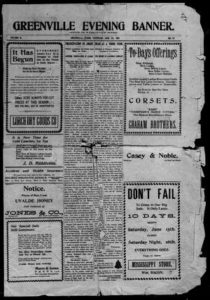Americans have read newspapers since colonial times.
Early in our history, local newspapers carried news from afar. There was no reason to print local news. Everybody knew what happened there. By the middle of the 19th century, newspapers were more political and national.
The pendulum switched back to local news by the 1890s.
Greenville had three newspapers in 1900. Local men preferred the Greenville Morning Herald with more information about politics, banking, and cotton prices. Women usually read the paper after their chores were completed.
They read about social events, church events, and various other matters of interest to them in the Greenville Evening Banner. Of course, if there was breaking news, the Banner posted it first. Both were published six days a week, with Sunday off for the staff.
The third newspaper actually styled itself a newspaper for Hunt County, and theoretically served local farmers. But every issue was full of what I call “chatty news.” Advertising was definitely interesting to 20th century readers.
One item from the Aug. 3 issue noted the “Failure of R.K. Lane.” It seems Mr. Lane filed for bankruptcy due to poor collections on credit sales. He assigned about $60,000 in property (probably store goods) to the debts of $30,000. But on Sept. 7 he ran this front-page ad, “I am pleased to announce that I have again secured control of my business. There is now in the store $25,000 worth of dry goods.”
Twenty merchants advertised in the Messenger that they were giving Trading Stamps along with merchandise purchased. Much like the later Green Stamps housewives collected to be redeemed at the Green Stamp Store from the 1930s to the 1980s. One week later, though, the merchants announced they had the trading stamp scheme. No reason was given.
Walter Boyd served in the Third Artillery during the Boxer War in China. In a letter to his sister in Greenville, he noted he had been in the Army for three months and 10 days, served on guard duty 12 nights and on post duty five days.
It seems he spent most of his time on police duty. Letters home from servicemen were frequently published in local newspapers verbatim. Today we would be amazed at the bias involved.
This was during the feverpitched rivalry between Wets and Drys for the production, sale, and consumption of alcohol. At 11:30 p.m. Sunday night, July 6, saloonkeeper and owner Bob Bolton and Deputy Constable Will Hardin got into a raging argument.
They went outside on Johnson Street to continue the verbal disagreement that soon ended in a pistol “duel” where both men died.
Another anti-saloon event occurred in the fall at The House of Lords, a saloon owned and managed by Bill Norman. None other than Carrie Nations and her followers armed with axes, bats, hatches, and any other weapon capable of destroying property entered the saloon.
In a short time, the place was filled with shattered glass, broken chairs and tables, and large amounts of alcohol running down the street. The ladies quietly marched out of the saloon as grown men bemoaned the loss of liquor.
One of the best ways to learn about a town, county, or region is to read local newspapers. Thankfully, old microfilm reels are being digitized to allow us to search for a specific topic or person, or just casually read to see what was going on.

